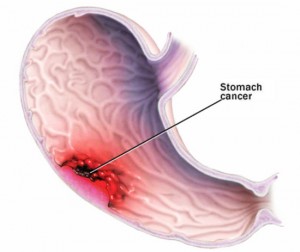 This is where cancer enters the tissues that line the stomach, which is a part of the human digestive system. It is the job of the stomach to break down food so that it can be easily digested by the rest of the digestive system.
This is where cancer enters the tissues that line the stomach, which is a part of the human digestive system. It is the job of the stomach to break down food so that it can be easily digested by the rest of the digestive system.
Around 95% of stomach cancers are referred to as “adenocarcinoma” that develops in the lining of the stomach. There are other more uncommon forms, such as lymphoma of the stomach, which develops in lymphatic tissues and gastrointestinal stromal tumors, which are found in the muscle or connective tissue of the wall of the stomach.
Other forms of small intestine cancers, which are also quite rare, include sarcoma, where cancer forms in the connective tissue and carcinoid tumor, which is slow growing.
What are the Signs and Symptoms of Stomach and Gastric Cancer?
There are a number of symptoms that are commonly associated with this form of cancer. In the early stages, these may include:-
- Trapped wind, acidity or frequent burping
- Persistent indigestion
- Feeling bloated
- Feeling full quickly after eating
- Pain in the stomach or sternum
- Difficulty when swallowing
- Feeling sick
- Heartburn
At a more advanced stage, the following symptoms may be experienced.
- Loss of appetite
- Blood in your stools
- Tiredness
- Weight loss
- Swelling of the stomach
- Yellowing of the skin and eyes
- Anemia
Risk Factors and Causes of Stomach and Gastric Cancer
- Age – Most cases of stomach cancer occur in those over 55 with the average age of diagnosis being 70.
- Gender – Men are twice as likely to develop stomach cancer than women.
- Smoking – A major cause of stomach cancer due to the toxic smoke that enters the stomach.
- Helicobacter pylori (H pylori) – Being infected with this bacteria can lead to stomach cancer.
- Previous Stomach Surgery – This can pose a high risk.
- Diet – There is a common link between stomach cancer and people who eat large amounts of pickled vegetables, salted fish and meats, and smoked foods.
- Family History – You are more likely to develop stomach cancer if a close relative has also had the condition. This is most likely due to genetic inheritance.
- Having another type of cancer – There is some evidence to suggest that if you have had another form of cancer, you are more at risk of developing stomach cancer. For men, these include prostate cancer, bladder cancer, bowel cancer and testicular cancer. For women, breast, ovarian and cervical cancers.
It is important to remember that just because you may have one of the symptoms or risk factors it does not necessarily mean you have stomach cancer.
Recommended Treatments for Stomach and Gastric Cancer
For further information on available treatments, please see our recommended stomach and gastric cancer treatment page.

